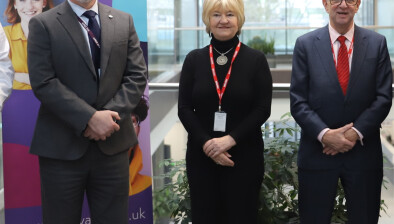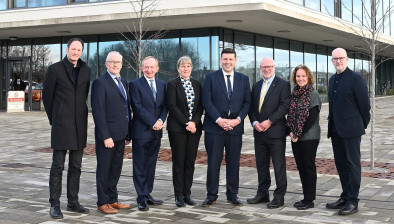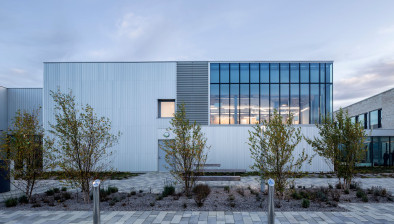Race to net zero sees surge in heat pump training
Harry Hunter at Forth Valley College’s Renewables Training Centre
Renewable energy apprentices now number a quarter of all heating engineer trainees as the race to install more air and ground source heating systems steps up.
In the latest intake at Forth Valley College’s Renewables and Energy Efficiency Training Centre, a quarter of the class of 16 apprentices are opting to be trained to fit renewable heating systems.
Heat pumps, powered by low-emissions electricity, are the central technology in the global transition to secure and sustainable heating.
Heating and powering buildings account for 30% of the UK’s total energy usage, so homes will play a vital role in the UK’s efforts to reach net zero carbon emissions. In 2025, compliance with the Future Homes Standard (FHS) will become mandatory. Its aim is to ensure that new homes built from 2025 will produce 75-80% less carbon emissions than homes built under the current Building Regulations.
This makes the development of skills for installing and maintaining low carbon heating systems more important than ever. With no gas boilers to be installed in new houses after 2025, demand for renewable energy engineers is projected to increase dramatically.
The renewables training centre at Forth Valley College’s Falkirk Campus plans to help meet this demand, not just by training new apprentices, but by offering existing gas engineers conversion courses, to give them the skills they need to take advantage of the expected surge in demand for low carbon heating systems.
Compared to new entrants to the field, existing gas engineers just need some complementary upskilling to start installing heat pumps.
Falkirk-based plumbing and heating engineer, Sean Lumsden was one of the first people to complete the College’s course in Air and Ground Source Heating installation.
He said: “I had a fairly good grasp of how to install these new types of heating systems. But wanted to get more in depth training and accreditation, as I’m now seeing a lot of new contracts coming up for new builds that have a requirement for air or ground source heat pumps rather than gas.
“It’s definitely the way the industry is going, so I was keen to get ahead of the game. I’ve now got 14 systems lined up for installation, so completing the course has paid off already and I can see this type of work overtaking my gas work before long. New builds in particular will be the driving force for renewable installations.”
The Forth Valley College facility is one of nine colleges across Scotland to host specialist renewables training centres. It was funded through a £500,000 funding boost from SP Energy Networks’ Green Economy Fund.
Training focuses on the fitting and maintenance of solar, thermal and photovoltaic equipment, along with air and ground source heat pumps.
Harry Hunter is the College’s Commercial Trainer in Renewables and he is seeing demand for places surging.
He said: “As of 2029 there will be no new manufacture of natural gas boilers, of course it will take another few years to phase out existing boilers, but renewables is the direction of travel we are on.
“There is currently a huge talent pool to draw on with 130,000 gas heating engineers currently registered across the UK, and we need to be tapping into this skills base. We need to be focusing on how we can persuade these trades people that there is going to be huge demand for renewable skills, not sometime in the distant future, but right now.”
According to the International Energy Agency heat pumps globally have the potential to reduce global carbon dioxide (CO2) emissions by at least 500 million tonnes in 2030 – equal to the annual CO2 emissions of all cars in Europe today.

















